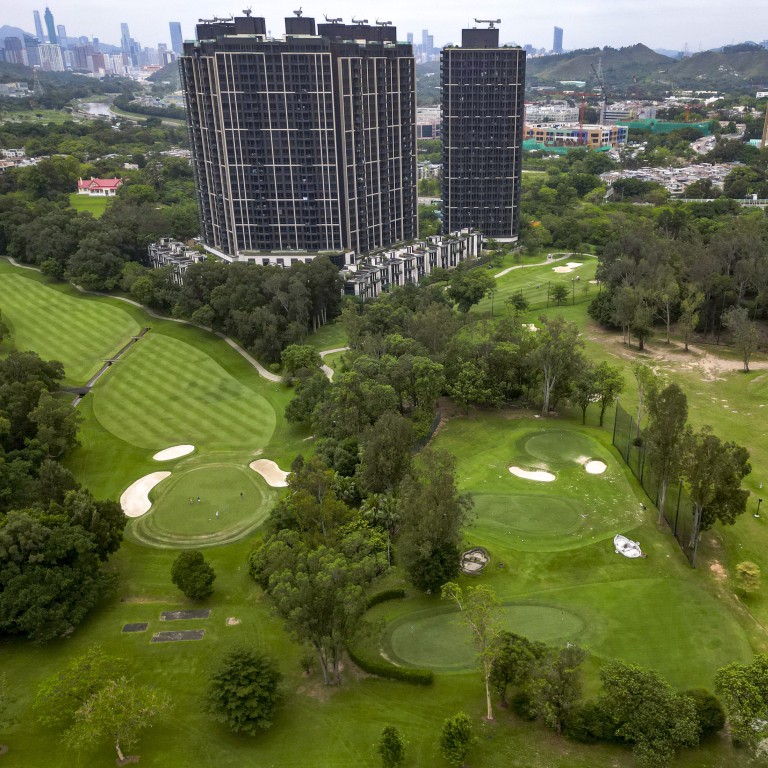
Hong Kong Golf Association warns building public housing on part of city’s oldest course will ‘suffocate’ future of sport
- Sports body’s chief executive officer says athletes have made great strides in tournaments because ‘they have had spaces for training’
- Environmental authorities on Thursday approved controversial public housing plan using land in Fanling leased by Hong Kong Golf Club
The government’s decision would “suffocate” the development of the sport and severely undermine professional golfers’ training, Danny Lai Yee-june, the organisation’s chief executive officer, on Friday said.
“In recent years, our athletes have entered the harvest season, with many getting good results in tournaments because they have had spaces for training,” he said.

“But where can they continue to practise after [part of] the golf course is taken back?” he asked.
The Environmental Protection Department approved on Thursday a plan to build 12,000 public flats on nine hectares (22 acres) of the 172-hectare golf course at Fanling by 2029. The development will take up about 32 hectares in total, all of it land known as the Old Course. The club will still have about 140 hectares of land with two complete 18-hole courses plus 10 holes for a third course to the west of Fan Kam Road.
But the department requested the layout be revised to preserve a patch of woodland at the heart of the housing area. The Hong Kong Golf Club leases the land from the government, which will resume management of the area earmarked for redevelopment in September.
The club had expressed deep regret at the decision, arguing an environmental impact assessment report for the project was “full of serious flaws and errors” and could not ensure “the integrity of the precious ecosystem”.
Hong Kong environment authorities conditionally approve golf course development
Most professional golfers were used to practising at the Fanling course, due to its relatively convenient location and the operator’s strong support for the sport, which included flexible access on weekdays, Lai said.
He stressed that practising on the greens could not be replaced by training at driving ranges as golfers had to learn how humidity, wind and altitude, among other external factors, affected their shots.
Apart from the one at Fanling, the city had five golf courses, a “pathetically small” number compared with other cities, and they were less accessible, had smaller capacity and some did not meet the universal format of 18 holes, Lai said. Many of Hong Kong’s 100,000 regular golfers were forced to play over the border in Shenzhen due to the lack of local facilities, he added.
While flats would only be built on part of the course, the site with only 10 holes remaining would no longer meet standards for practising the sport and hosting games, he noted.

The existing parking lot, staff dormitories, a multipurpose playground and break rooms for caddies would be demolished and need to be relocated to other parts of the course, shrinking it yet further, he said.
Apart from the athletes, public access to the course would also be affected, he argued, noting 40 per cent of 500,000 visits to the course made each year were by non-members.
Lai said the course, where 70 per cent of local golf matches were held, was expected to host the 2025 National Games.
“The organisers, as well as many mainland golfers, wished the game could be held at the historic Fanling golf course. We have a consensus on that,” he said. “And the part which will be taken back by the government has the best draining system, which makes it the most suitable site for a game in the rainy summer season.”
Bid to keep woodland, flat target at Hong Kong housing site ‘may alter design rules’
Lai called on authorities to include golf courses in plans for future mega projects.
The government on Thursday reiterated that relevant departments would provide appropriate assistance if the club required temporary additional land to organise major events.
The Leisure and Cultural Services Department would be responsible for the management and maintenance of the part of the golf course earmarked for proposed development, and it would announce its opening arrangements in the future.

The redevelopment project still needs approval from the Town Planning Board, the Chief Executive in Council and the Legislative Council.
Town planning advisers on Friday approved postponing the deadline to submit a statutory plan on the project to the government’s top decision-making body for discussion to November.
The board’s secretariat added that it needed more time to organise a public hearing on the project.
Hong Kong must save old trees, experts urge as Chinese banyan gets axe
The woodland set for preservation, consisting of 186 trees, is in the heart of the nine-hectare housing area, in a section designated for one of the residential blocks, a podium garden with commercial developments and parking spaces, a public transport interchange, and part of a building that would accommodate community facilities.
City leader John Lee Ka-chiu’s administration has set up two task forces to resolve housing issues and measures to speed up the construction of public flats.
Deputy Financial Secretary Michael Wong Wai-lun, who leads the task force on public housing projects, last year said there were targets to add about 100,000 public housing flats in the next five years. The second five-year period aims to add over 230,000 units by 2032.
Additional reporting by Edith Lin

